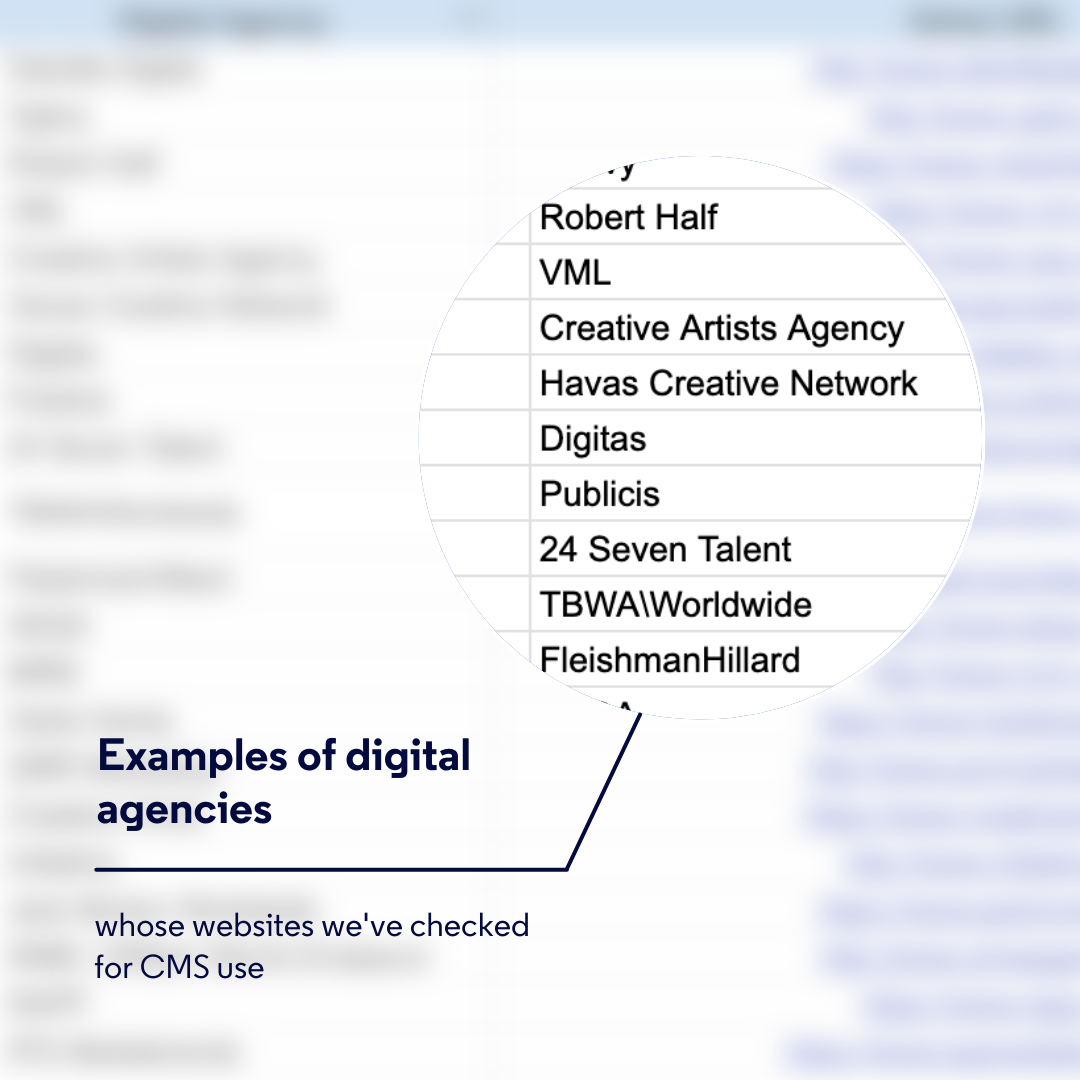
"Success is related to standing out, not fitting in." These words from Don Draper, the main character in the iconic show Mad Men, perfectly capture the spirit of today’s digital agencies. Their websites are often creative masterpieces full of innovative solutions that set them apart from the competition. But which CMS platforms help them create these engaging websites? We analyzed the home pages of 200 digital agencies worldwide to answer this.
How did we gather the data for this article?
The data collection wasn’t random. Using LinkedIn’s Sales Navigator platform, we identified 200 digital agencies with diverse business profiles (including media houses, advertising agencies, and full-service agencies). We focused on companies with headcount ranging from 501 to over 10,000 employees.
When searching for agencies, we narrowed the business characteristics to the term “digital agency.” We filtered out companies that didn’t fit the digital agency profile (such as government organizations, banks, or insurance firms). We classified agencies based on the descriptions provided on their websites.

We used the popular Wappalyzer tool to identify the CMS platforms used on these agencies' home pages. For cases where the plugin didn’t detect CMS, we conducted further verification on WhatCMS.org.
Will our analysis confirm the dominance of popular systems, as was the case in our report on CMS usage among higher education institutions? Or will we uncover less well-known tools? Let’s dive into the data.
Which digital agencies choose Drupal?
Since Drupal is a crucial technology for us, we’ll start by reviewing its results. This open source CMS allows for the creation of visually appealing websites. It stands out for its flexibility, broad range of modules, and advanced content management capabilities. Additionally, it supports integration with marketing and analytics tools, making it easier to run successful campaigns. Let’s see how many agencies have tapped into its potential.
- Out of the 200 agencies we examined, 8 companies (4%) have their home page built on Drupal.
- Among advertising agencies, two out of 11 companies chose Drupal (18.18%).
- Out of 15 talent agencies, one company (6.67%) picked Drupal.
- As for public relations agencies (including communication companies), two (12.50%) out of 16 companies have a website on Drupal.
- As for media agencies, one (4.76%) out of 21 companies use Drupal.
- Out of 36 digital marketing agencies, one (2.78%) has a website on Drupal.
- In the category of marketing agencies, one (3.70%) out of 27 companies chose Drupal.
- Drupal wasn’t chosen by any of the following agency types: full-service agency (0 of 29), branding, design, and innovation agency (0 of 16), and creative agency (0 of 27).
Which digital agencies use Drupal?
Among the digital agencies that have built their websites on Drupal is one of the most influential advertising firms – Ogilvy (including its South African branch).
The famous agency, founded in 1948 by David Ogilvy, a copywriter and one of the most renowned advertising creators, uses Drupal to create dynamic, scalable websites targeting different markets. This could serve as inspiration for other agencies, proving that choosing Drupal enables the creation of powerful platforms capable of supporting global marketing campaigns.
Other large companies employing more than 501 people (according to Sales Navigator) that use Drupal include:
- Creative Artists Agency
- Digitas
- Spark Foundry
- MSL (Global)
- Ariadna Communications Group
- Zeno Group
What Drupal versions did we find on the home pages of digital agencies?
As mentioned above, 8 of the 200 digital agencies we analyzed use Drupal. What versions of this CMS are they using on their home pages? Let’s take a look:
- Four digital agencies chose Drupal 10 – one media agency, one digital marketing agency, one PR firm, and one marketing agency.
- Three digital agencies use Drupal 9 – one talent agency and two advertising agencies.
- One digital agency is still using Drupal 8 – a PR firm.
It’s worth noting here that Drupal 8 and 9 are no longer officially supported. For websites built using these versions, it’s recommended to upgrade to Drupal 11 to ensure smooth operation, and security, and to take advantage of new features.
Most popular CMS systems among large global digital agencies
Our analysis of major digital agency websites shows that the most popular CMS among the recognized technologies is WordPress. This tool was chosen by 107 agencies (53.50%).
The next most preferred content management system among the technologies identified is Contentful, which 10 companies (5.0%) reached for. For 44 (22.0%) digital agencies, we didn’t detect a CMS, and for this article, the charts show the status as "Unknown."
As mentioned above, Drupal, in the group of all digital agencies, chose 8 companies for their service, which is 4.00% of the total.
Our review of the main websites also shows that among digital agencies, systems such as Squarespace (on 6 sites), Adobe Experience Manager (detected on 5 sites), HubSpot CMS Hub (on 5 sites), Storyblok (on 4 sites), Craft CMS (on 2 sites), and Sanity (on 2 sites) are also readily used.
CMS selection among talent agencies
We’ve also singled out talent agencies (including recruitment agencies) for this article. These agencies help brands and companies find freelancers or full-time employees. They most often specialize in digital marketing and creative industries, but some also serve sports, entertainment, or media fields.
Again, in this case, the most popular CMS is WordPress. We found it out of 15 talent agencies on 6 (40.00%) home pages. Others with this business profile chose technologies such as Adobe Experience Manager, Contentful, Umbraco, and Drupal 9. Each of these systems is discovered on one website.
For 5 websites, the CMS platform remains unrecognized.
Popular content management systems among media agencies
For this article, we also analyzed the websites of 21 media houses. These agencies mainly engage in media planning, buying, and data analytics related to their campaigns. What CMS systems do companies with this business profile choose?
In this case, WordPress also takes first place. It appears 14 (66.67%) times out of 21 media house home pages. In contrast, Contentful CMS, TYPO3 CMS, and Drupal 10 occur one time each. The Wappalyzer plugin didn’t show any content management system on the four websites.
What CMS systems do PR agencies use?
The next type of company we highlight in this blog post is public relations and communications agencies. This group includes companies engaged in strategic communications and PR, as well as agencies offering crisis management and media relations-building services.
Eight home pages (50.00%) of PR and communications agencies are based on WordPress. In three cases, the CMS wasn’t recognized. Other systems of choice are HubSpot CMS Hub (detected for 2 sites), as well as Drupal 10, Drupal 8, and Concrete CMS. The latter three technologies appeared on single websites.
CMS systems popular among full-service agencies
We’ve included companies with diverse offerings that use the term "full-service" in their descriptions. Some are more marketing-oriented and provide services related to branding, web design, and digital marketing solutions. Others, on the other hand, have an advertising profile and offer creative content creation, digital campaigns, or media buying.
The full-service agencies we analyzed chose 6 CMSs for their websites. The most popular tool is WordPress - 14 (48.28%) out of 29 companies with this profile reached for this technology. The second demonstrated and popular system is Squarespace, which we found on 3 (10.34%) home pages.
Adobe Experience Manager, ProcessWire, Sanity, and Wagtail also occurred on individual sites. For 3 sites, the content management system remains unrecognized.
What CMSs do digital marketing agencies choose?
For this article, we’ve included companies offering different types of services in the digital marketing agencies group. Some of them offer PPC, social media, SEO, and data-driven marketing. Others work with clients on digital transformation, customer experience, and ecommerce. There are also agencies whose main business is web development and working with specific technologies.
Digital marketing agencies choose a variety of CMSs. The most popular solution is WordPress - 22 (61.11%) out of 36 companies have a home page managed using this system.
The agency's choices here also included systems such as Contentful (5.56%) and Craft CMS (5.56%), which each appeared twice, as well as Drupal 10 (2.78%), HubSpot CMS Hub (2.78%), and Storyblok (2.78%), which were shown in sites once each. The CMS remains unknown for the 7 digital marketing company home pages.
Content management systems chosen by creative agencies
We also looked at which CMSs were reached for by companies that describe themselves as creative agencies. This group included organizations at the intersection of various activities, such as consulting, influencer marketing, customer experience, and advertising campaigns.
Among creative agencies, the choice falls primarily on WordPress. Fourteen (51.85%) of 27 companies opted for this technology for their homepage. In 6 cases (22.22%) the system wasn’t detected.
Other content management systems we found on creative agency sites are Storyblok and Contentful, used 2 times each (7.41%), as well as Adobe Experience Manager, HubSpot CMS Hub, and Squarespace – witnessed on home pages one time each (3.70%).
Most popular CMSs among advertising agencies
Another group of agencies we found in the SalesNavigator tool is advertising agencies. These organizations are primarily responsible for creating customer experiences through engaging digital campaigns.
Six of the 11 advertising agencies (54.55%) reached for WordPress for their home pages. Two companies chose Drupal 9 as their CMS, accounting for 18.18% of the total results for this group. The Wappalyzer plugin also appeared once for each system, such as Adobe Experience Manager (9.09%) and Squarespace (9.09%).
What systems do marketing agencies choose?
The next category we reviewed is marketing agencies. Here, we’ve included companies engaged in general marketing and event marketing, as well as companies targeting specific industries, including technology agencies, health marketing agencies, sports marketing agencies, and organizations promoting only education.
Of the 27 marketing agencies, seventeen (62.96%) use WordPress on their home pages. Individual companies have reached for systems such as Adobe Experience Manager (3.70%), Apostrophe CMS (3.70%), Drupal 10 (3.70%) and Sulu (3.70%).
For 6 (22.22%) websites, the CMS remains unrecognized.
CMS systems on branding, design, and innovation agency websites
The final group of creative industry companies we’ve selected for this article are branding, design, and innovation agencies. We included organizations involved in brand image, graphic design, or digital transformation within one category.
In this case, we detected WordPress on the home pages of 6 (37.50%) out of 16 agencies. Three companies (18.75%) manage their websites using Contentful, and single agencies use technologies such as HubSpot CMS Hub (6.25%), Sanity (6.25%), Squarespace (6.25%), and Storyblok (6.25%). However, the CMS system remains unrecognized for 3 agencies (18.75%).
Use of CMS systems by digital agencies - summary
Our analysis of the main sites of 200 large global digital agencies shows that the most popular CMS is WordPress, detected on 53.50% of home pages. Although less popular, Drupal was found to be used in 4.00% of cases, mainly in media and marketing agencies.
Recognition was also given to systems such as Adobe Experience Manager, Contentful, Craft CMS, HubSpot CMS Hub, Sanity, Squarespace, and Storyblok, which we detected on more than one homepage.
At Droptica, we support digital agencies and their clients in selecting and implementing CMS systems (most notably Drupal) and professional partnerships. We can expand your team with skilled developers to complete the project from A to Z.











